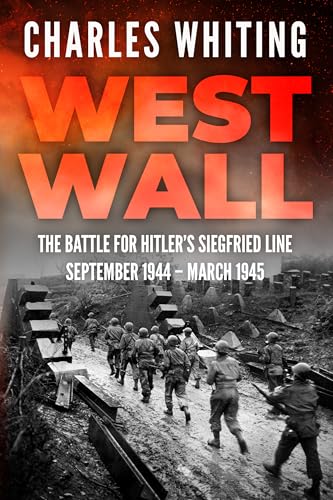
A detailed account of the long and deadly battle for Hitler’s Siegfried Line during World War Two from September 1944 to March 1945. This is the perfect read for fans of Charles B. MacDonald, Tim Saunders, Samuel W. Mitcham Jr, and Steven J. Zaloga. The battle for the Siegfried Line or Germany’s West Wall covered a front of 350 miles and cost the allies (British, Canadian, American and French), during six long and bloody months, over a quarter of a million casualties. Built in secret by Hitler between 1936-39 at enormous expense and regarded as a ‘white elephant’ by many it was widely mocked, becoming the subject of a popular comic song among allied troops singing how they ‘would hang their dirty washing’ on the Siegfried Line. At the time little did anyone expect it to cause the war to be extended by six months at such an enormous cost to human life and to be the scene of the biggest battle fought by the United States in the twentieth century. In this book author Charles Whiting, using numerous historical sources including; books, articles and interviews contends that rather than being viewed as a series of separate engagements what happened during this time at the Seigfried Line should be recognised as the single most important battle of the entire war in the west. Using vivid descriptions and direct quotes from allied commanders and soldiers, Whiting recounts the critical decisions that were made and the suffering and trauma experienced by those on the ground in the most horrific battlefield conditions as they tried time and again to break through Hitler’s impregnable fortified line.
Author

Charles Whiting was a British writer and military historian and with some 350 books of fiction and non-fiction to his credit, under his own name and a variety of pseudonyms including Ian Harding, Duncan Harding, K.N. Kostov, John Kerrigan, Klaus Konrad, and Leo Kessler. Born in the Bootham area of York, England, he was a pupil at the prestigious Nunthorpe Grammar School, leaving at the age of 16 to join the British Army by lying about his age. Keen to be in on the wartime action, Whiting was attached to the 52nd Reconnaissance Regiment and by the age of 18 saw duty as a sergeant in France, Holland, Belgium and Germany in the latter stages of World War II. While still a soldier, he observed conflicts between the highest-ranking British and American generals which he would write about extensively in later years. After the war, he stayed on in Germany completing his A-levels via correspondence course and teaching English before being enrolled at Leeds University reading History and German Language. As an undergraduate he was afforded opportunities for study at several European universities and, after gaining his degree, would go on to become an assistant professor of history. Elsewhere, Whiting held a variety of jobs which included working as a translator for a German chemical factory and spells as a publicist, a correspondent for The Times and feature writer for such diverse magazines as International Review of Linguistics, Soldier and Playboy. His first novel was written while still an undergraduate, was published in 1954 and by 1958 had been followed by three wartime thrillers. Between 1960 and 2007 Charles went on to write over 350 titles, including 70 non-fiction titles covering varied topics from the Nazi intelligence service to British Regiments during World War II. One of his publishers, Easingwold-based Rupert Smith of GH Smith & Son said he was a quiet man and prolific writer. "He's one of a band of forgotten authors because he sold millions of copies and still, up to his death was doing publishing deals.He was the kind of man who was very self-effacing, one of Britain's forgotten authors, still working at 80 years of age, with his nose down and kicking out books." Charles Henry Whiting, author and military historian died on July 24 2007, leaving his wife and son.